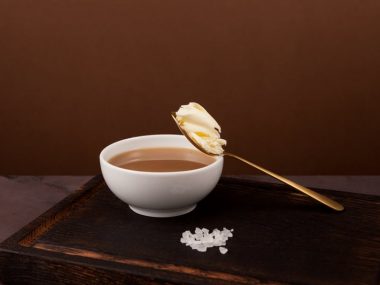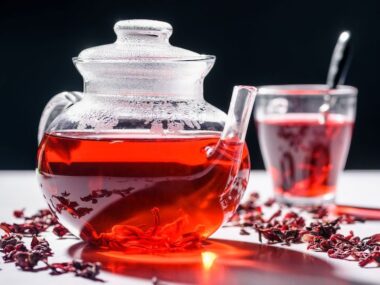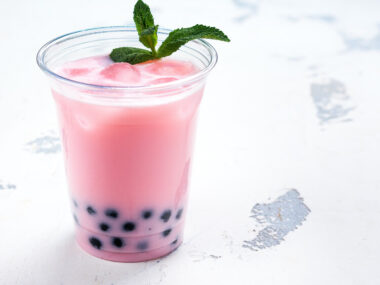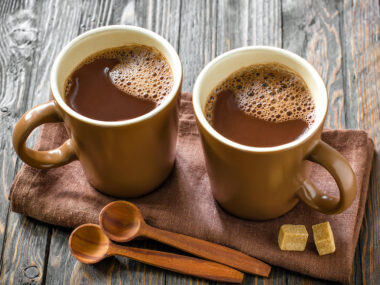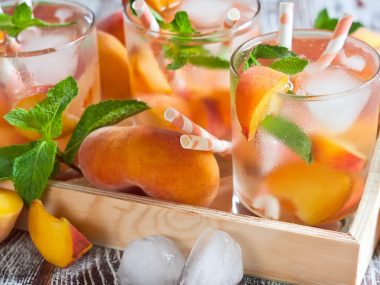There’s a very dark side of caffeine that you need to know about. We reveal the hidden dangers of adulterated caffeine drinks sold right in tea shops and online. When seeking a boost in energy, know what to stay away from and opt for something healthier.
Table of Contents
What Is The Best Tea For Energy?
There are numerous teas that give us a boost in energy. So, how do you know what kind of tea gives you energy when you need it most? Let’s look at various teas that may put the pep back in your step. There’s a smorgasbord of teas out there to select from!
True teas (black, green, oolong, yellow, white) are naturally caffeinated. Two tisanes (herbal tea) are also naturally caffeinated (yerba mate, yaupon.) With these things in mind, let’s take a look at some lovely teas.
True Teas
Every tea differs in the amount of caffeine they contain. Various factors influence how much caffeine a true tea yields.
Things such as terroir, cultivation, harvest, and processing all play a role in how caffeinated a true tea will be. Brewing true teas also affects caffeine levels. The longer the brew, the higher the caffeine.
The Journal of Analytical Toxicology published a study that researched different teas and their respective caffeine levels. With this in mind, we are able to give you a list of true teas (based on the study’s findings) that may have the kick of caffeine you need to feel energized.
Black Tea
Black tea is higher in caffeine than any other true tea.
- English Breakfast
- Irish Breakfast
- Earl Grey
- Assam
- Darjeeling
- Lady Grey
- Black tea infused with peppermint or spearmint
Green Tea
So, does green tea give you energy since it’s lower in caffeine than black tea? Green tea delivers ample caffeine to help you feel refreshed and recharged.
- Matcha
- Moroccan Mint
- Sencha
Tisanes (Herbal Teas)
If tisanes are caffeine-free, what herbal tea will give you energy?
- Yerba Mate
- Yaupon
- Peppermint
- Spearmint
- Tisanes with a blend of black or green tea
- Ginseng
- Ginkgo Biloba
- Chocolate Tea
Morning Tea
One of the leading questions our readers ask with regard to energizing teas is, “What type of tea wakes you up and gets you going in the mornings?” Caffeine is the key to finding a tea that perks you right up. Some of us need that added boost because we are just not morning people.
So, we want to look at teas that are higher in caffeine and be mindful not to consume too much caffeine that we go into overload.
Black teas typically contain more caffeine than other true teas such as green, oolong, yellow or white. Matcha green tea is the exception as it is a caffeine powerhouse.
Suggested Morning Teas
- English Breakfast
- Irish Breakfast
- Earl Grey
- Assam
- Darjeeling
- Lady Grey
- Yunnan
- Nilgiri
- Ceylon
- Matcha
Fatigue Busting Tea
Fatigue can be psychological or physiological, or a combination of both. Fatigue causes us to feel completely wiped out.
Physical fatigue is often the result of overusing our muscles from lifting, exercising, and so on. Mental fatigue is brought on from our mind being over-stimulated, prolonged heightened awareness or over vigilance, stress, or prolonged state of fight or flight. So how do you know what tea helps fatigue?
What better way to combat both fatigues than with a nice cup of black tea infused with either spearmint or peppermint? The caffeine in the black tea provides a physiological boost from caffeine intake, while the aroma of mint acts as a stimulant on the brain, helping to restore alertness and focus.
According to a research article entitled “Instant Effects of Peppermint Essential Oil on the Physiological Parameters and Exercise Performance,” the aroma of peppermint stimulates the brain’s alertness.
Things To Know About Caffeine
Now that we know what teas give us that kick of “oomph” when we need it, let’s find out more about the “oomph” known as caffeine and what its bioactive relationship is with our body.
In today’s world, many live life in the fast lane, never slowing down. The ability to make it through each day is determined by espresso shots, Matcha shots, endless cups of coffee, and energy drinks. One common element within these energizing drinks is caffeine.
Caffeine is present in true teas (black, green, puerh, oolong, yellow, and white,) chocolate, coffee, energy drinks, and some medications.
Natural caffeine is present in the tea plant (Camellia sinensis,) herbaceous plants (yaupon, yerba mate,) coffee beans, and in cacao beans (used to make chocolate.) Energy drinks, over-the-counter drugs, and amped-up coffees usually contain synthetic caffeine or caffeine extract from guarana.
The Bioactivity Of Caffeine
Caffeine is a class of compounds known as xanthines. If extracted, it produces a highly bitter-tasting white powder known as 1,3,7 trimethylxanthine. Surprisingly, caffeine is classified as a psychostimulant drug in the same group as amphetamines and cocaine.
When ingested, caffeine becomes fully absorbed by the human body anywhere between 45 minutes to 2 hours. Once absorbed, the brain sends signals causing a state of arousal, alertness, and energy through the release of cortisol and adrenaline (the fight or flight hormone.)
Peak effects of caffeine occur between 15 minutes to 2 hours. Consuming caffeine on an empty stomach results in a quicker boost of senses.
The liver is responsible for breaking down caffeine, and it may take up to 9 hours for caffeine to be broken down and eliminated. Factors such as smoking or being pregnant affect the speed at which our bodies break down caffeine. Pregnant women are far slower to break down caffeine, causing it to be active in the body for up to 15 hours. Smoking, on the other hand, causes the body to rapidly break down caffeine.
Is Caffeine Okay To Consume Daily?
Not everyone can tolerate caffeine. More importantly, caffeine may worsen existing medical conditions, interact with certain medications or cause the body to be too slow or fast in breaking down caffeine, according to Harvard School of Public Health.
It’s unsafe to consume caffeinated weight loss supplements or aids to keep you awake while consuming caffeinated drinks. Side effects of caffeine include rapid heartbeat, increased blood pressure, and irritability.
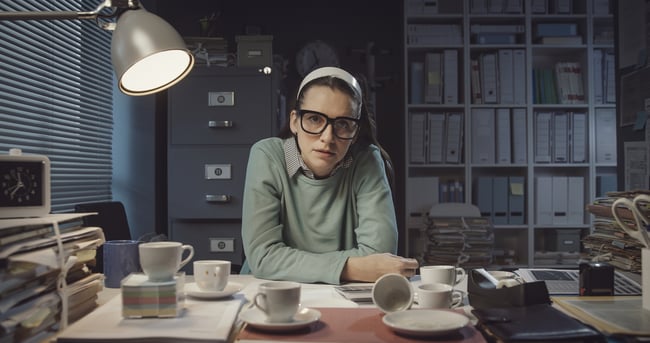
The Victorian State Government Health cautions against overconsumption of caffeine. Doing so can lead to numerous symptoms such as feeling hot, increased urination, dehydration, feeling dizzy or anxious, shaking, insomnia, and experiencing a “crash” after a burst of energy.
Too much caffeine can also cause the stomach to release gastric acid (leading to digestive upset or heartburn.) Calcium absorption may be influenced negatively by the presence of caffeine within the body.
If you have any medical conditions, are taking medication or caffeinated supplements, are pregnant or nursing, or undergoing chemotherapy or radiation, it’s best to talk to your healthcare provider before consuming tea.
There is a recommended maximum amount of caffeine per day to avoid adverse reactions or side effects of caffeine overconsumption. The Food and Drug Administration recommends that we don’t consume more than 400 mg of caffeine daily. This is roughly about 4-6 cups of tea.
Examples Of Caffeine Present In Drinks
Serving Size of 6-8 ounces
- Tea: up to 60 mg
- Tisanes (Herbal Tea:) 0 mg (unless they contain a blend of true tea such as black, green, oolong, yellow, or white)
- Soda: up to 55 mg
- Drinks Containing Guarana: up to 125 mg
- Energy Drinks: up to 85 mg
The Danger Of Powdered Caffeine
Pure caffeine powder is used to enhance consumables and medication. Energy drinks (in ready-to-drink form and those sold in local health and tea shops) have this powder added to enhance the drink. This enhancement can be highly dangerous should it fall within the wrong hands of someone who abuses it or adds too much.
A warning was issued by the Food and Drug Administration about the dangers of pure caffeine powder and the fact that it is being sold by the bag fulls through online retail. One teaspoon of this drug has about 2,800 mg of caffeine (equal to about 47 cups of tea.) Should a tea drinker be inclined to add caffeine powder to a cup of tea, the risk of overdose is high. Caffeine overdose presents with seizures, dangerous heartbeat, and even death.
When visiting tea shops that sell “energy drinks/teas,” don’t be shy in asking if they adulterate (enhance) teas with caffeine powder. Such drinks can be highly toxic if too much caffeine powder is added. Beware of purchasing high-caffeine teas online because the Food and Drug Administration does not require retailers to include caffeine count on the packaging, as noted in the Journal of Caffeine Research’s article on this topic.
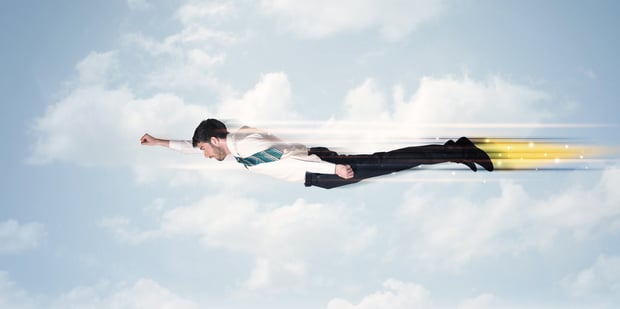
Recipe For A Lovely Energizing Tea
Instead of relying on retailers to provide you with a quality tea that has the elements needed to combat fatigue, brain fog, or serious lack of motivation from lack of energy, we have a great recipe to make your own tea.
Ingredients:
- 2 cups of water
- ½ teaspoon of loose-leaf Ceylon black tea
- ½ teaspoon of loose-leaf Moroccan Mint green tea
- ⅛ teaspoon of cacao nibs
- A few shavings from a dark (sweetened) chocolate bar
Directions:
- Heat the water to about 185 degrees (F) (85 degrees C.)
- Remove from the heat.
- Place the loose-leaf Ceylon and Moroccan Mint teas and cacao nibs into a tea infuser.
- Drop the tea infuser into a teapot.
- Pour the hot water into the teapot.
- Place the teapot cover on and allow it to steep for 5 minutes.
- Pour the hot tea into a teacup.
- Add the chocolate shavings.
- Slowly stir and enjoy!
An Energy Booster That Has Possibili-TEAs
Caffeinated teas may be quite effective in restoring depleted energy. Stay within the recommended daily caffeine intake and clear tea consumption with your doctor. Lastly, don’t forget that aromas from tea also play a big role in restoring mental vigor.

